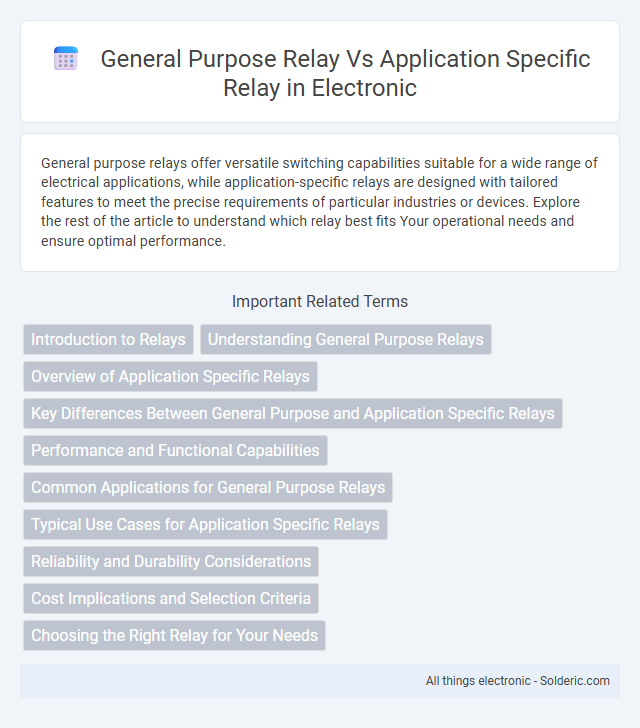General purpose relays offer versatile switching capabilities suitable for a wide range of electrical applications, while application-specific relays are designed with tailored features to meet the precise requirements of particular industries or devices. Explore the rest of the article to understand which relay best fits Your operational needs and ensure optimal performance.
Comparison Table
| Feature | General Purpose Relay | Application Specific Relay |
|---|---|---|
| Design | Standard, multipurpose design | Tailored for specific applications |
| Functionality | Basic switching operations | Specialized features and functions |
| Durability | Moderate, suitable for various environments | High, optimized for targeted use cases |
| Performance | General performance, adequate for most tasks | Enhanced performance for specific applications |
| Cost | Lower cost due to mass production | Higher cost, specialized manufacturing |
| Customization | Limited customization options | High customization to meet precise needs |
| Examples | Automotive relays, household relays | Telecom relays, industrial control relays |
Introduction to Relays
Relays are essential electrical components that allow control of high-power circuits using low-power signals. General Purpose Relays are versatile devices designed to function in a wide range of applications, offering reliable switching capabilities across various voltage and current levels. Application Specific Relays are tailored for specialized tasks, optimized for unique operational requirements, ensuring enhanced performance and durability in your targeted use cases.
Understanding General Purpose Relays
General Purpose Relays serve as versatile switching devices capable of handling a wide range of electrical applications, offering flexibility across various circuits and loads. These relays typically feature universal contact arrangements and standardized voltage ratings, making them suitable for both AC and DC operations in industrial, automotive, and household settings. Understanding General Purpose Relays helps you select reliable components that ensure safe and efficient control without the limitations imposed by specialized functions or fixed parameters found in Application Specific Relays.
Overview of Application Specific Relays
Application Specific Relays (ASRs) are designed for targeted functions in specialized industries such as automotive, telecommunications, and industrial automation, offering optimized performance for those applications. Unlike General Purpose Relays, ASRs feature tailored contact configurations, switching capacities, and protection mechanisms to meet specific operational demands. This specialization enhances reliability, efficiency, and durability within their intended use cases.
Key Differences Between General Purpose and Application Specific Relays
General purpose relays offer broad compatibility with various circuits and voltages, making them versatile for multiple uses, whereas application specific relays are designed for targeted functions with optimized performance in specialized environments. Your choice depends on factors such as load type, switching frequency, and environmental conditions, as application specific relays often provide enhanced reliability and efficiency for particular tasks. Key differences include coil voltage ranges, contact arrangements, and response times that are tailored to suit general or specific application requirements.
Performance and Functional Capabilities
General Purpose Relays offer broad functionality with moderate switching speed and current ratings suitable for various applications, but lack specialized features for industry-specific demands. Application Specific Relays provide enhanced performance through tailored switching speeds, contact configurations, and protection mechanisms optimized for targeted uses such as automotive, telecommunications, or industrial automation. Functional capabilities in Application Specific Relays often include integrated diagnostics, precise timing controls, and environmental resistances, which surpass the generalized features found in General Purpose Relays.
Common Applications for General Purpose Relays
General purpose relays are widely used in industrial automation, HVAC systems, and lighting control due to their versatility and ability to handle various load types. These relays provide reliable switching for motors, solenoids, and other electrical devices, making them essential in manufacturing equipment and building management systems. Their adaptability and ease of integration make them suitable for general control tasks across multiple industries.
Typical Use Cases for Application Specific Relays
Application specific relays are designed for targeted functions such as automotive control systems, HVAC systems, and telecommunications equipment where precise timing, load management, and environmental conditions must be met. They provide optimized performance and reliability for specialized tasks, including motor control, alarm systems, and power distribution in industry-specific applications. These relays improve system efficiency by addressing the unique electrical and mechanical requirements of their intended use cases.
Reliability and Durability Considerations
General Purpose Relays are designed for versatility across various applications, offering moderate reliability and durability suitable for general use. In contrast, Application Specific Relays are engineered for specialized functions, providing enhanced reliability and durability under specific operational conditions. Selecting the appropriate relay depends on the environmental demands and the criticality of performance in the intended application.
Cost Implications and Selection Criteria
General Purpose Relays offer cost-effective solutions with versatility across multiple applications, making them suitable for standard functions with minimal customization needs. Application Specific Relays incur higher costs due to tailored designs that meet specialized performance and environmental requirements, justifying investment in high-precision or critical systems. Selection criteria prioritize operational voltage, switching capacity, environmental conditions, and the required relay life cycle to balance performance demands against budget constraints effectively.
Choosing the Right Relay for Your Needs
Choosing the right relay depends on your specific application requirements and operational environment. General Purpose Relays offer versatility and cost-effectiveness for a wide range of standard switching tasks, while Application Specific Relays provide tailored features, higher precision, and enhanced reliability for specialized industrial or automotive uses. Evaluating factors like voltage, current rating, switching speed, and environmental conditions ensures optimal performance and longevity in your relay selection.
General Purpose Relay vs Application Specific Relay Infographic

 solderic.com
solderic.com